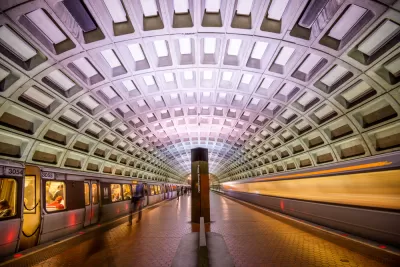Depending on how the issue is phrased, support for public transit can be bipartisan.

I recently saw a conference speech suggesting that geographic polarization was terrible for transit, because as Republicans have become a more rural party, they have become more anti-transit than ever. However, a recent Data for Progress survey suggests that public opinion is a bit more nuanced. Although Republicans are generally not as pro-transit as Democrats, pro-transit propositions often met with significant or even majority support from Republicans.
The good news is that when asked to agree or disagree with the statement "The United States would benefit from better public transit," only 26 percent of suburban Republicans disagreed, along with only 29 percent of rural Republicans. When asked about their own communities, rural and suburban Republicans were almost evenly split—understandably given the extremely low density of most of rural and suburban America.
Since Republicans are often more skeptical of government spending, one might expect a strong partisan split about any poll questions involving the word "funding." Sixty-five percent of Democrats favored more funding for transit, only 4 percent favored less funding, and 21 percent favored keeping funding the same. Republicans overwhelmingly favored the middle position; 48 percent favored keeping funding the same, as opposed to 20 and 19 percent favoring increases and cutbacks, respectively.
But Republicans can also be skeptical of road spending, depending on how a question is asked. Seventy-three percent of them favored fixing old roads before building new ones, and 63 percent favored a ten-year moratorium on new roads (a number roughly comparable to the percentage of Democrats taking these positions).
One bit of bad news for transit advocates is that Republicans and Democrats are more sharply divided when taxes are mentioned. The survey asks whether respondents would be willing to pay higher taxes for transit. Democrats overwhelmingly supported the idea; Republicans were mostly against the tax increase, though 35 percent took the pro-tax, pro-transit position. In addition, Republicans who oppose new roads usually weren’t willing to go further and remove existing freeways. After being informed of the case for removing urban freeways, Republicans opposed conditioning federal transportation funding on freeway removal plans by about a 2-1 margin.
On balance, it seems to me that rank-and-file Republicans are generally not completely anti-transit, and are generally perfectly happy to support existing levels of funding and service—a result that seems consistent with Congressional Republicans' consistent support of status quo-oriented transportation bills. Although Republicans are much more skeptical of major new transit investments, a significant minority of Republicans are persuadable even as to new projects.

Maui's Vacation Rental Debate Turns Ugly
Verbal attacks, misinformation campaigns and fistfights plague a high-stakes debate to convert thousands of vacation rentals into long-term housing.

Planetizen Federal Action Tracker
A weekly monitor of how Trump’s orders and actions are impacting planners and planning in America.

In Urban Planning, AI Prompting Could be the New Design Thinking
Creativity has long been key to great urban design. What if we see AI as our new creative partner?

King County Supportive Housing Program Offers Hope for Unhoused Residents
The county is taking a ‘Housing First’ approach that prioritizes getting people into housing, then offering wraparound supportive services.

Researchers Use AI to Get Clearer Picture of US Housing
Analysts are using artificial intelligence to supercharge their research by allowing them to comb through data faster. Though these AI tools can be error prone, they save time and housing researchers are optimistic about the future.

Making Shared Micromobility More Inclusive
Cities and shared mobility system operators can do more to include people with disabilities in planning and operations, per a new report.
Urban Design for Planners 1: Software Tools
This six-course series explores essential urban design concepts using open source software and equips planners with the tools they need to participate fully in the urban design process.
Planning for Universal Design
Learn the tools for implementing Universal Design in planning regulations.
planning NEXT
Appalachian Highlands Housing Partners
Mpact (founded as Rail~Volution)
City of Camden Redevelopment Agency
City of Astoria
City of Portland
City of Laramie






























